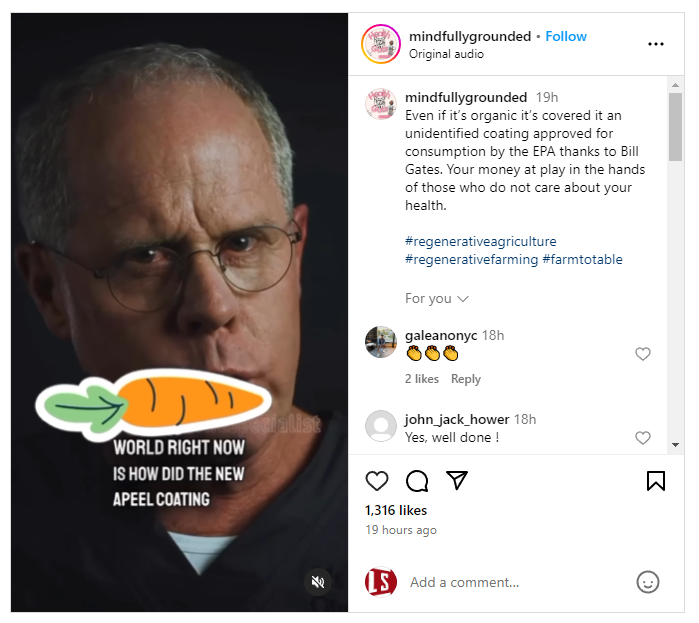
Does the Apeel produce coating Organipeel contain an "unidentified coating" that is falsely labeled as organic and that could be harmful to human health? No, that's not true: Though it may be applied to organic produce, it is neither considered an organic product by regulatory agencies nor does the company claim it to be. Orangipeel is a coating used to delay produce spoilage and is primarily made of a derivative from plant oils but it also contains citric acid.
The claim originated in a video shared to Instagram on December 20, 2023, (archived here) with a caption that read:
Even if it's organic it's covered it an unidentified coating approved for consumption by the EPA thanks to Bill Gates. Your money at play in the hands of those who do not care about your health.
#regenerativeagriculture #regenerativefarming #farmtotable
Below is how the post appeared at the time of this publication:
 (Source: Instagram screenshot taken Thu Dec 21 04:39:00 2023 UTC)
(Source: Instagram screenshot taken Thu Dec 21 04:39:00 2023 UTC)
An unidentified person on-screen stated the following:
The product intended to be organic, listed as Organipeel, is registered with the EPA as a pesticide with a rather short and cryptic ingredient list. Active ingredient, citric acid at .66%. Other ingredients, not named, 99.34%...
The EPA requires this caution on the label: Wash thoroughly with soap and water after handling and before eating. The certificate the Organic Material Review Institute [OMRI] issued to it, that approved its use on organics, lists it as a fungicide with no ingredients specified.
Shown in the video is a screenshot of an eye irritation warning, which implies that this "unidentified coating" could be dangerous. However, that warning applies only to raw powder -- not food products.
Apeel is a coating used to delay produce spoilage and is primarily made of a derivative from plant oils. Orangipeel, a version intended for use on organic produce, also contains citric acid, an organic compound found in citrus fruits utilized in the U.S. as an antimicrobial pesticide, fungicide, virucide, and other uses. Though Apeel may be applied to organic produce, the product is neither considered an organic product nor does the company claim it to be.
"At this time, Apeel coating has been determined to be safe for consumers," Melissa Prest, a Chicago-based registered dietician nutritionist and spokesperson for the Academy of Nutrition and Dietetics, wrote to Lead Stories in an email received December 23, 2023.
Naturally derived citric acid is commonly used as a pesticide, fungicide, and virucide
OMRI is a nonprofit organization that provides an independent review of products. In response to Lead Stories' request for comment, it referred our newsroom to a May 26, 2023, news release (archive) and article (archive) that addressed comments and questions around fruit coatings, writing:
Fruit and vegetable coatings, sometimes called edible films, are applied directly to the outside of produce in order to preserve freshness and maintain quality standards often associated with appearances that consumers have come to expect. Besides orange shellac, other common materials used for these purposes include starch, carrageenan, alginates, wood rosin and various waxes.
Citric acid is commonly used in such coatings, which the EPA described to Lead Stories as "an antimicrobial pesticide used as a disinfectant, sanitizer, bactericide, fungicide/fungistat, and virucide for hard non-porous surfaces included in many products for use in residential and public access premises, and in fruit and vegetable washes for use as a disinfectant, sanitizer, virucide, and germicide."
Citric acid is a food-grade substance that has been classified by the FDA as GRAS when used in foods with no limitations other than current good manufacturing practices. It has also been tested in Europe for safety and has been reported as safe for consumers.
An Apeel spokesperson further described their product to Lead Stories, writing that:
Products that are categorized as fungicides are not inherently dangerous for human use or consumption. There are a wide array of fungicides that are effective against mold or other fungi, but have no negative impacts on humans. Fungicides require testing that specifically demonstrates their safety for human consumption when the product is intended for use in our food. We intend for our product to be consumed with the fruit or vegetable, which is why we only use ingredients that are safe to eat.
Because our Organipeel formulation for organic produce contains citric acid naturally sourced from Cassava root, this is how the EPA classifies our product. But it's not a fungicide or pesticide in the traditional sense that may immediately come to mind. Our goal is to give the inherent defense mechanisms in plants a boost by helping to fend off mold, thereby increasing the health and quality of produce.
Organipeel is a non-organic produce coating
Apeel is a company that produces a plant-derived post-harvest coating used to extend the shelf life of fruits and vegetables. One of the company's products, Organipeel, is a coating that also contains citric acid, an organic compound found in citrus fruits that is utilized in the U.S. as an antimicrobial pesticide, fungicide, and virucide, among other uses. The safe-to-eat coating is also made of mono and diglycerides, naturally occurring lipids, that are derived from plant oils to "mimic the natural protection already existing on fruits and vegetables."
"Apeel is a coating made from grapeseeds that contain mono- and diglycerides," Prest told Lead Stories. "The coating when applied to produce like apples, avocados, cucumbers, limes, and oranges reduces spoilage of the produce and also reduces the use of plastic wrap on produce because spoilage is minimized."
Both monoglycerides and diglycerides were recognized as safe for food products by the Food and Drug Administration (FDA) in 1989.
Though Organipeel may be applied to organic produce, it is neither considered an organic product by regulators nor does the company claim it to be.
"The Apeel label does not make an organic claim," the EPA wrote Lead Stories in an email received on December 28, 2023.
An Apeel spokesperson confirmed as much in an email to Lead Stories received on December 22, 2023:
Organipeel is considered a fungicide, which is a category of pesticide. As such, it is subject to EPA labeling regulations. As an EPA Registered pesticide, our label must disclose the active ingredient in the product (citric acid) and list the concentration of active ingredient and inert ingredients. As the video shows, our label complies with this requirement.
It is important to note that it doesn't always take a large amount of something to have an impact-Organipeel doesn't need an overwhelming amount of citric acid for the product to do its job: reduce spoilage and decay caused by non-public health microorganisms on the surface of fruits and vegetables. All we need is 0.66%.
Monoglycerides and diglycerides make up the other 99.34 percent of Organipeel ingredients.
The product is also registered under the Federal Insecticide, Fungicide, and Rodenticide Act, which requires that all products "will not generally cause unreasonable adverse effects on the environment.''
The inert ingredients listed on the label are sodium bicarbonate (baking soda) and mono- and diglycerides, Apeel told Lead Stories. All inert ingredients approved for use in U.S. pesticide products applied to foods are listed in the Code of Federal Regulations (CFR), 40 CFR part 180.
"Many food use inert ingredients have use limitations and restrictions. All food use inert ingredients are also permitted for nonfood use," the EPA told Lead Stories. "Inert ingredients are not required to be identified in the ingredient statement on the pesticide label except when EPA determines that such inert ingredients may pose a hazard to man or the environment."
Lead Stories has debunked other claims made about organic products, including that organic sulfur compound methylsulfonylmethane (MSM) does not cure stage 4 breast cancer and reverse autism as well as relieve lupus symptoms, that fruit stickers do not have a code that can mean they are "sprayed with pesticides", and that scientists did not issue a warning against use of canola oil with studies that show it causes brain damage, dementia, and weight gain.

















